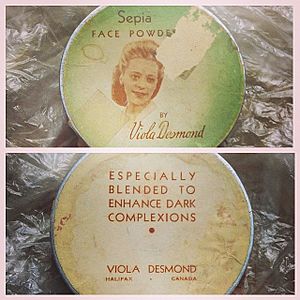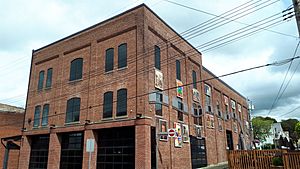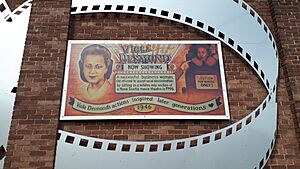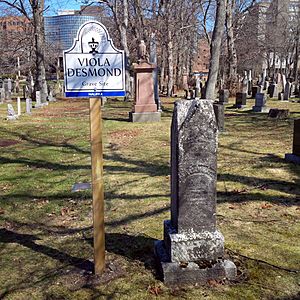Viola Desmond facts for kids
Quick facts for kids
Viola Desmond
|
|
|---|---|
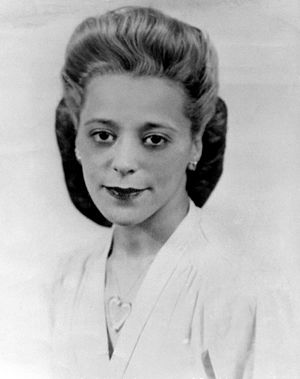
Desmond c. 1940
|
|
| Born | July 6, 1914 Halifax, Nova Scotia, Canada
|
| Died | February 7, 1965 (aged 50) New York City, U.S.
|
| Resting place | Camp Hill Cemetery, Halifax |
| Occupation | Business owner and beautician |
| Known for | Challenging unfair racial rules in Canada after refusing to leave a whites-only cinema seat in 1946 |
| Spouse(s) | Jack Desmond |
Viola Irene Desmond (July 6, 1914 – February 7, 1965) was a brave Canadian businesswoman. She was also an important activist for civil rights and women's rights. Viola was from Black Nova Scotian heritage.
In 1946, she stood up against unfair rules at a cinema in New Glasgow, Nova Scotia. She refused to leave a section of the Roseland Theatre that was only for white people. Because of this, she faced a legal challenge. She was accused of a small tax issue related to the one-cent difference between her ticket and the seat she chose.
Viola Desmond's case became a very well-known example of racial discrimination in Canadian history. It helped to start the modern civil rights movement in Canada.
In 2010, Viola Desmond received a special posthumous free pardon. This was the first time such a pardon was given in Canada. A free pardon means the person is considered to have never committed the offense. It cancels any penalties like fines. However, it was not until 2021 that the government repaid the original fine. They gave a $1,000 scholarship to her family, adjusting for the value of money over time. The government of Nova Scotia also apologized for the legal action against her. They recognized she was right to resist unfair racial rules.
In late 2018, Desmond became the first Canadian-born woman to appear alone on a Canadian bank note. She is featured on the $10 bill. This was revealed by important government officials in March 2018. Desmond was also named a National Historic Person in 2018.
Contents
Who Was Viola Desmond?
Viola Desmond was a courageous woman who fought for fairness. Her actions helped change Canada for the better. She showed great strength in standing up for what was right.
Early Life and Dreams
Viola Desmond was born on July 6, 1914. She was one of ten children in her family. Her parents were James Albert and Gwendolin Irene Davis. She grew up in Halifax. In 1917, when Viola was three, she survived the Halifax Explosion. Her whole family was safe. Viola's father worked as a stevedore (someone who loads ships) and later became a barber.
As she grew up, Viola noticed something important. There were no good hair and skin-care products for Black women. She decided to do something about this need. Because of unfair rules, she could not train as a beautician in Halifax. So, she traveled to Montreal, Atlantic City, and New York for her training. She even studied at one of Madam C. J. Walker's famous beauty schools.
After her training, Viola returned to Halifax. She opened her own hair salon called Vi's Studio of Beauty Culture. Many women became her clients, including famous singer Portia White.
Viola also opened The Desmond School of Beauty Culture. This meant Black women did not have to travel far to get proper training. Women from Nova Scotia, New Brunswick, and Quebec came to her school. The school taught students how to start their own businesses. It also helped create jobs for other Black women in their communities. Each year, about fifteen women graduated. All of them had been turned away from schools that only accepted white students. Desmond also created her own product line, Vi's Beauty Products. She sold these products herself.
A Stand for Fairness at the Cinema
On November 8, 1946, Viola was traveling to Sydney. She was going to sell her beauty products. Her car broke down in New Glasgow. While waiting for repairs, she decided to watch a movie. It was called The Dark Mirror at the Roseland Film Theatre.
Even though there were no official laws for segregation in Nova Scotian cinemas, the Roseland had its own rules. Main-floor seats were saved for white customers. Viola was sold a ticket for the balcony. She did not know about the unfair seating rule. Viola was nearsighted, so she went to sit in the main-floor section. It was closer to the screen.
When asked to move, she understood what was happening. She refused to move because she had a better view from the main floor. She asked to exchange her balcony ticket for a main-floor one, offering to pay the extra cost. Her request was denied. She was then forced to leave the theatre, hurting her hip in the process.
The Legal Challenge Begins
Viola Desmond was arrested. She was accused of a small tax issue and fined $26. The balcony ticket cost 30 cents with a two-cent tax. The main-floor ticket cost 40 cents with a three-cent tax. She was accused of not paying one extra cent in tax. Desmond was held in jail for twelve hours. She was not told about her right to legal advice or a lawyer.
When she returned to Halifax, Viola talked with her husband. He suggested she let the matter go. However, she then sought advice from her church leaders. The Minister William Pearly Oliver and his wife Pearleen encouraged her to take action. With their support, Desmond decided to fight the legal challenge in court.
The Court Case and Its Outcome
After Viola decided to fight the charge, Carrie Best shared Desmond's story. It was in the first edition of The Clarion. This was the first Black-owned newspaper in Nova Scotia. Best wrote about Desmond's story on the front page. This was because Best herself had faced unfair rules at the Roseland Theatre before.
With help from her church and the Nova Scotia Association for the Advancement of Coloured People (NSAACP), Desmond hired a lawyer. His name was Frederick William Bissett. He represented her in the court cases. He also tried to sue the Roseland Theatre, but this was not successful.
During the trials, the government kept saying it was a case about a tax issue. A provincial law about cinemas required a tax based on the ticket price. Since the theatre only sold Viola a cheaper balcony ticket, but she sat in a more expensive seat, she was one cent short on tax. The law used to accuse Desmond did not mention race or discrimination.
Viola's lawyer, Bissett, made two main arguments. Both were unsuccessful. First, he argued that Desmond was denied "natural justice," which we now call due process. At that time, this idea was new and not accepted by the court. Second, he argued there was not enough proof of a tax issue. This argument also failed. Later, experts thought he could have argued that courts should not enforce racial segregation. This would have forced a decision on whether such rules were fair.
When the case was dismissed, Justice William Lorimer Hall made an important comment. He wondered if the theatre manager truly cared about one cent of tax. Or if it was a hidden way to enforce unfair racial rules.
Her lawyer, Bissett, did not charge Desmond for his work. The money raised was used to support William Pearly Oliver's new NSAACP.
Her Life After the Event
After the court case and her experience with the legal system, Viola's personal life changed. She closed her business. She then moved to Montreal to study at a business college. Later, she settled in New York City. She passed away there on February 7, 1965, at the age of 50, due to health problems. She is buried at Camp Hill Cemetery in Halifax, Nova Scotia.
A Lasting Legacy of Courage
William Pearly Oliver later thought about Viola Desmond's impact. He said her actions meant a lot to their community. He believed it was a strong effort to gain rights. People came together with one voice. This brave stand made the Black community more respected across the province. He felt that many positive changes that happened later came from this event.
Desmond is often compared to Rosa Parks. Both women bravely challenged racism by refusing to give up their seats. They both helped start the Civil Rights Movement. This happened even though there were no specific laws enforcing segregation in theatres.
Honoring Viola Desmond
Viola Desmond has been widely honored across Canada. This is in recognition of her role in the civil rights movement. It also celebrates her contributions to making things fair for everyone. Here are some important ways she has been remembered:
- In January 2019, a teacher named Temma Frecker received an award. Her students proposed building a statue of Desmond in Cornwallis Park. They imagined Desmond's statue talking with other statues. These included Acadian Noël Doiron, Mi'kmaq Chief John Denny Jr., and Edward Cornwallis. This would represent a conversation about their achievements and struggles.
- Cape Breton University started a scholarship program in honor of Viola Desmond and her sister Wanda Robson. They also created the Viola Desmond Chair in Social Justice. Graham Reynolds holds this position. Reynolds and Wanda Robson wrote two books about Viola Desmond.
- In 2009, Toronto Metropolitan University created the annual Viola Desmond Award and Bursary. This award honors Black women and Black gender-diverse people. It recognizes those who have made a positive impact on the school community.
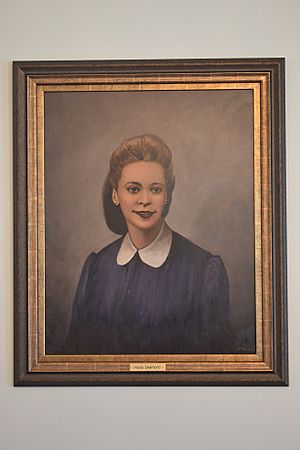
- In 2010, Mayann E. Francis, who was the Lieutenant Governor of Nova Scotia, showed a portrait of Desmond. It is now on permanent display in the ballroom at Government House in Nova Scotia.
- Canada Post released a special stamp featuring Viola Desmond in 2012. This was part of a series celebrating important Canadians.
- On July 7, 2016, a ferry in Halifax Harbour was named the Viola Desmond. This honored her legacy in the city where she took her stand.
- On December 8, 2016, Desmond was chosen to appear on the Canadian ten-dollar bill. She became the first Canadian-born woman and the first Black Canadian to be on a regularly used Canadian banknote. The new design was shown on November 26, 2018. It features Desmond's picture on the front. The back shows a map of Halifax's historic North End and the Canadian Museum for Human Rights.
- The federal government named Desmond a National Historic Person of Canada on January 12, 2018.
- In June 2018, Canada's Walk of Fame honored Desmond with a star. It was unveiled at the Halifax Ferry Terminal.
- That same year, the City of Toronto renamed Hupfield Park as Viola Desmond Park. It is in the Malvern neighborhood of Scarborough.
- In July 2018, a part of Forbes Street in New Glasgow was renamed Viola's Way. This street is outside the former Roseland Theatre. It honors her historic stand.
- In February 2019, the Royal Canadian Mint released its first Black History Month coin. It was a pure silver coin featuring Viola Desmond.
- In April 2019, the International Bank Note Society gave an award to the Canadian ten-dollar note. The note featuring Viola Desmond won the Bank Note of the Year Award for 2018.
- In April 2021, the Hamilton-Wentworth District School Board announced a new elementary school. It was named in Desmond’s honor. The Viola Desmond Elementary School opened in September 2021. It serves students from kindergarten to Grade 8.
- In November 2022, the Toronto International Film Festival (TIFF) announced a renaming. The largest screening room at the TIFF Bell Lightbox became the Viola Desmond Theatre. It opened in 2023.
Apology and Pardon Details
On April 14, 2010, the Lieutenant Governor of Nova Scotia, Mayann Francis, granted Desmond a posthumous free pardon. This was done on the advice of Premier Darrell Dexter. It was the first such pardon given in Canada. A free pardon is very special. It is given only in rare cases and means the person was innocent. Francis, who is also a Black Canadian, said, "here I am, 64 years later—a black woman giving freedom to another black woman."
The Premier also offered an apology. Desmond's younger sister, Wanda Robson, and Dr. Graham Reynolds helped make sure Desmond's name was cleared. There was a public acknowledgment of the unfairness. The government also promised to uphold human rights. In February 2015, the first Nova Scotia Heritage Day was declared in Desmond's honor. Desmond's portrait also hangs in Government House in Halifax.
In 2021, a high school student named Varishini Deochand asked the government to repay Desmond's original court fees. The government of Nova Scotia offered a symbolic repayment to her only living family member, Wanda Robson. Robson said she would use the money for a scholarship at Cape Breton University. So, the government increased the repayment from the current value of $368.29 to $1,000. The provincial government also gave a special check to display in the legislature. The original court costs were $26.
See also
 In Spanish: Viola Desmond para niños
In Spanish: Viola Desmond para niños
- Black Nova Scotians
- Canadian Museum for Human Rights
- Charles Daniels (activist)
- Cornwallis Street Baptist Church
- Joan Jones
- Racial segregation in Canada
 | James Van Der Zee |
 | Alma Thomas |
 | Ellis Wilson |
 | Margaret Taylor-Burroughs |


